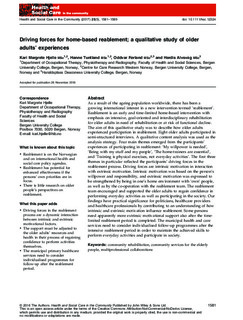Driving forces for home-based reablement: a qualitative study of older adults’ experiences
Original version
Hjelle, K.M., Tuntland, H., Førland, O. & Alvsvåg, H. (2016) Driving forces for home-based reablement: a qualitative study of older adults’ experiences. Health & Social Care in the Community. 10.1111/hsc.12324Abstract
As a result of the ageing population worldwide, there has been a growing international interest in a new intervention termed ‘reablement’. Reablement is an early and time-limited home-based intervention with emphasis on intensive, goal-oriented and interdisciplinary rehabilitation for older adults in need of rehabilitation or at risk of functional decline. The aim of this qualitative study was to describe how older adults experienced participation in reablement. Eight older adults participated in semi-structured interviews. A qualitative content analysis was used as the analysis strategy. Four main themes emerged from the participants’ experiences of participating in reablement: ‘My willpower is needed’, ‘Being with my stuff and my people’, ‘The home-trainers are essential’, and ‘Training is physical exercises, not everyday activities’. The first three themes in particular reflected the participants’ driving forces in the reablement process. Driving forces are intrinsic motivation in interaction with extrinsic motivation. Intrinsic motivation was based on the person’s willpower and responsibility, and extrinsic motivation was expressed to be strengthened by being in one’s home environment with ‘own’ people, as well as by the co-operation with the reablement team. The reablement team encouraged and supported the older adults to regain confidence in performing everyday activities as well as participating in the society. Our findings have practical significance for politicians, healthcare providers and healthcare professionals by contributing to an understanding of how intrinsic and extrinsic motivation influence reablement. Some persons need apparently more extrinsic motivational support also after the timelimited reablement period is completed. The municipal health and care services need to consider individualised follow-up programmes after the intensive reablement period in order to maintain the achieved skills to perform everyday activities and participate in society.
Description
Hva er drivkreftene i hverdagsrehabilitering slik de eldre opplever det.

